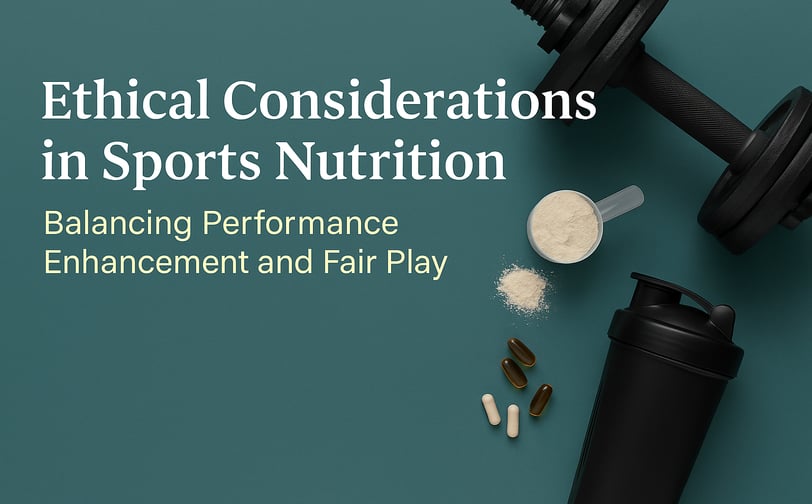Ethical Sports Nutrition: How to Enhance Performance Without Crossing the Line
Explore the ethical side of sports nutrition—learn how to use supplements like creatine, caffeine, and BCAAs safely and fairly. Backed by science, expert tips, and third-party tested product picks for peak performance without compromise.
5/16/20253 min read


Ethical Considerations in Sports Nutrition
Balancing Performance Enhancement and Fair Play
In the world of sports, nutrition plays a crucial role in recovery, performance, and long-term health. But as supplements and ergogenic aids become more sophisticated, athletes face a growing ethical dilemma—how far is too far when it comes to enhancing performance? Where do we draw the line between strategic fueling and unfair advantage?
This article explores the science behind performance supplements, the ethical frameworks that guide their use, and how athletes can optimize results while respecting the spirit of fair play.
Understanding Ergogenic Aids and Their Role in Performance
Not all supplements are created equal. Some, like creatine monohydrate, caffeine, and BCAAs, have been extensively studied and show consistent benefits for athletes when used appropriately. For example, creatine has been shown to improve muscle power and recovery, especially during short bursts of high-intensity training. Caffeine, meanwhile, can increase focus and reduce perceived exertion, making it a go-to for endurance and sprint athletes alike.
But it’s important to note that many products on the market mix ingredients in proprietary blends with little evidence, inconsistent dosages, or misleading claims. That’s where the ethical gray area begins. Athletes must decide: are they fueling smarter—or relying on unregulated shortcuts?
Where Ethics and Sports Nutrition Collide
Most people agree that doping is unethical. But what about legal supplements that provide a small edge? That’s where things get tricky.
The World Anti-Doping Agency (WADA) provides a global standard, but even within those lines, some choices may feel questionable. Is it ethical to use a stimulant that enhances alertness just before a race? Or to stack multiple legal products for an edge that others might not afford or understand?
The key is intention and fairness. Using evidence-based supplements to support your training is one thing—cutting corners to bypass effort or recovery is another. Transparency matters. So does following regulations that preserve the level playing field.
The Risks Behind the Bottle
Aside from ethics, there’s a real risk factor. Studies show up to 35% of supplements on the market may contain banned or mislabeled ingredients—sometimes without disclosure. That’s a nightmare for serious athletes who are subject to drug testing, but even recreational lifters deserve peace of mind.
That’s why it’s essential to look for third-party certifications like NSF Certified for Sport or Informed-Sport, which test for banned substances and verify label accuracy. Athletes should also work with qualified dietitians or sports nutritionists to build a safe and strategic supplement plan based on their goals and training phases.
Product i'd recommend 1:
Optimum Nutrition Creatine Monohydrate
A clean, effective creatine with no fillers. Micronized for better absorption and tested for banned substances.
👉 [https://amzn.to/3FdsOTp]
Periodizing Supplement Use for Ethical Impact
Ethical supplementation isn’t just about what you take—it’s about how and when you take it. For example, creatine is best used during strength-building phases, while caffeine should be reserved for race day or big events to avoid dependency. Even protein timing can play a role—20-30g post-workout supports recovery without going overboard.
By periodizing supplement use to align with your training cycle, you not only get better results, but also minimize unnecessary intake. It’s about using tools wisely—not constantly chasing a magic bullet.
What the Experts Say
According to leading sport scientists, even the most effective supplements provide small, marginal gains—usually around 2–5%. That might not sound like much, but in elite competition, that can be the difference between gold and off the podium.
The message is clear: supplements are support, not shortcuts. They should enhance a solid foundation of training, nutrition, sleep, and mindset—not replace them.
Product i'd recommend 2:
Caffeine Bullets Energy Chews
Fast-acting caffeine chews perfect for pre-event focus. Easy to carry and quick to kick in.
👉 [https://amzn.to/4j8xEPJ]
Playing the Long Game: Ethics in Recovery
Supplements aren’t just about performance. They also help athletes recover more efficiently—which is a crucial (and often overlooked) part of the ethical discussion. Supporting recovery in a natural, safe way is not only smart—it’s sustainable.
Using BCAAs or post-workout formulas that support muscle repair and hydration helps reduce the risk of injury and burnout. That said, again, moderation and timing are key.
Product i'd recommend 3:
XTEND Original BCAA Powder
Sugar-free, NSF-certified BCAAs to support recovery without unnecessary extras.
👉 [https://amzn.to/4mg3dtP]
Final Thoughts
At the end of the day, ethical sports nutrition comes down to three things: education, intention, and transparency. There’s nothing wrong with using proven supplements to support your goals—but it should always be done with care, honesty, and awareness.
Athletes who prioritize long-term health, respect the rules, and stay informed can fuel their performance the right way—without crossing ethical lines or compromising their integrity. And that’s the kind of win that lasts.
FITNESS
Nutrition
WellnesS
info@movebetterco.com
© 2025. All rights reserved | Privacy Policy | Terms & Conditions